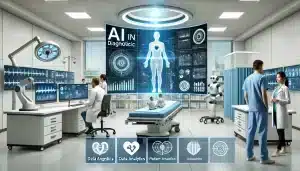The integration of artificial intelligence (AI) into the healthcare sector is revolutionizing the way healthcare providers interact with patients and deliver care. With the help of AI technologies, health organizations can improve efficiency, enhance patient outcomes, and streamline different processes within the healthcare system. For this reason, this article unfolds the various applications of AI in health care, its role in diagnosis and treatment, its impact on patient care and interaction, and future potential of AI in medical research.
What is AI in Healthcare and How is it Used?
Understanding Artificial Intelligence in the Healthcare Sector
Application of AI Technologies and Algorithms in Health Care Artificial intelligence in healthcare is often taken to be the application of AI technologies and algorithms for purposes of analyzing data that is related to health, supporting clinical decision-making, and eventually improving the delivery of healthcare. AI systems can process massive amounts of medical information, such as EHRs, medical history, and medical images, to extract useful insights that can help healthcare professionals diagnose and treat their patients. AI technologies are increasingly being applied to the healthcare sector to streamline patient care and to improve the efficiency of healthcare providers.
Examples of AI Technologies in Healthcare
Many AI technologies are being used today in healthcare environments to enhance several aspects of interaction and patient care. For instance, AI algorithms can scan medical images, such as X-rays and MRIs, for abnormalities that may indicate diseases like cancer. Virtual health assistants, based on AI, can also provide instant responses to patients’ queries, book appointments, and remind patients of their medication time. These are among many practical applications that AI is gradually penetrating in everyday practice in healthcare.
How Healthcare Organizations Use AI
Healthcare organizations apply AI for increased efficiency in operations and quality of care. Reducing the administrative burdens associated with AI in clinical practice allows healthcare providers the precious time to spend on engaging with their patients. AI systems are useful in patient record management, predicting outcomes, and optimization of treatment plans. The use of AI in healthcare improves the accuracy of diagnostic and treatment outcomes while significantly lowering the costs of healthcare as an asset for the healthcare organizations.
How Does AI Improve Diagnosis and Treatment in Healthcare?
AI Algorithms for Accurate Diagnosis
Enhancement of Diagnostic Accuracy The most important benefits of AI in healthcare is the enhancement in terms of accuracy to diagnose. AI algorithms can consider various complex health data to figure out some patterns that human medical practitioners would fail to identify otherwise. For example, AI can be helpful in the early detection of diseases through patient medical history analysis and correlation with huge data put together from clinical studies. This capability enhances informed decision-making on time intervention among healthcare providers and thus improves treatment of patients.
Using AI in Healthcare for Personalized Treatment Plans
The significance of customized treatment plans is more in the health sector today, and AI turns out to be an essential tool behind those customized treatment plans. The application of AI tools in the health care sector would help providers analyze personal patient data such as medical history and genetic information and work up specific treatment plans based on each patient’s need. This therefore helps patients gain better health outcomes as well as a rise in patient satisfaction, since they are now more interested in what they are being treated for.
Benefits of Using AI for Cancer Diagnosis
The influence of AI on the diagnosis of cancer is quite dramatic. AI algorithms can scan medical images with precision that is often surpassed by manual methods. For instance, AI systems can spot minute, slight alterations in the character of the tumor and may find minute changes in the size of the tumors hinting at malignancy. AI can significantly increase the chances of survival and alleviate psychological and financial pressures due to the late detection of cancer through improved diagnostic accuracy in cancer diagnosis. Hence, the use of AI in cancer diagnostics could be a great development in the health industry.
What Role Does AI Play in Patient Care and Interaction?
Enhancing Patient Experience with AI Technologies
AI technologies change patient experiences through tools to help patients interact more positively with their healthcare providers. For instance, AI-based chatbots can help a patient understand the health care system better by answering general questions and make appointments and update them on available treatments. Virtual health assistants are available at any hour and offer assistance and information to patients to complement their experience in the health care sector.
AI for Health: Tools for Better Patient Communication
Communication can always be an effective tool in an efficient system of delivering care to patients, and AI may enhance it significantly. Tools of AI can help physicians communicate better with their patients by reminding them, educating them, and providing follow-up instructions, all of which should be specific to the type of diseases these patients have. AI encourages collaboration between patients and themselves while guaranteeing that they understand what is happening and are willing participants in the process.
How AI Can Help in Managing Patient Records
Patient record management is one of the most important approaches in healthcare delivery. AI can automatically update electronic health records by extracting pertinent information from anywhere. Therefore, it decreases the administrative burden in the healthcare side. Such an integration improves the accuracy of the records in a medical practice and allows care providers to access updated patient information while providing better care.
How is Generative AI Transforming Medical Research?
Generative AI in Healthcare: What You Need to Know
Now that generative AI is becoming an emerging powerful tool in medical research, researchers can add new hypotheses and insights to existing data by analyzing large datasets. The potential health trends that can be unearthed through generative AI could help the healthcare system develop innovative approaches for treatment and diagnosis. Its applicability is indeed important in drug discovery, because AI could simulate how different compounds interact with biological systems, which may eventually lead the way to breakthroughs in medicine.
Using AI in Healthcare for Innovative Medical Research
AI seems to be playing an important role in the promoting medical innovative research by providing health practitioners with the ability to sift through huge amounts of information quickly. One can use AI algorithms to identify correlations of different health factors and corresponding disease outcomes, leading to the development of novel treatment modalities. This not only facilitates more speed across medical research but also makes all interference for improvement in population health efficacy.
Population Health Management with AI Technologies
Another sector where AI technologies are strikingly making their mark is in population health management. Using its advanced capability for the examination of large-scale health data, AI can identify trend and risk factors within specific populations. That knowledge can be used by a healthcare provider in the delivery of targeted interventions and preventive measures, thereby improving health outcomes in communities. Since AI allows deploying healthcare resources far more optimally than traditional methods, it presents a mammoth opportunity for effectively handling population health and, by extension, improving the whole health system.
What are the Benefits of Using AI in the Healthcare Industry?
Improving Patient Outcomes through AI
The main advantage derived from using AI in the healthcare sector would be towards the patients’ better outcome. It improves on diagnostic efficiency, personalizes treatment plans, and enhances better communication with patient providers, thereby improving the care process to be more effective and efficient. AI technologies also help avoid errors and aid in enhancing patient safety, thereby delivering maximum quality of care possible toward an individual.
AI and Robotics: A New Frontier in Healthcare
With AI and robotics, new frontiers in healthcare are opening. Robotic systems with AI capabilities can help during surgeries, bringing precision to ensure improved patients’ safety and quickened recovery times. AI-driven robots can also be helpful in supporting elderly patients who experience loneliness when the robots are able to provide them with friendship and support in everyday activities, thereby improving their quality of life. The integration of AI and robotics will surely revolutionize the care and interaction with patients to a major level.
Future Trends in AI for Health and Patient Care
Looking ahead, the future of AI in health and patient care is bright. Continued advancements in AI algorithms and technologies will likely lead to even greater improvements in diagnosis, treatment, and patient interaction. As healthcare organizations increasingly adopt AI solutions, we can expect to see a more efficient healthcare system that prioritizes patient-centered care. The potential for AI to revolutionize the healthcare industry is immense, making it an exciting area to watch in the coming years.




